Williams County, Ohio
Williams County is a county located in the U.S. state of Ohio. As of the 2020 census, the population was 37,102.[1] Its county seat is Bryan.[2] The county was created in 1820 and later organized in 1824.[3] It is named for David Williams, one of the captors of John André in the American Revolutionary War.[4]
Williams County | |
|---|---|
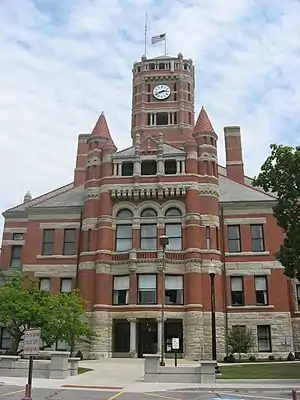 Williams County Courthouse in Bryan | |
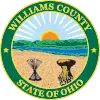 Seal | |
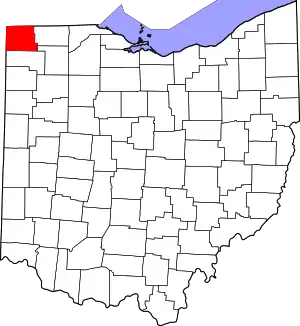 Location within the U.S. state of Ohio | |
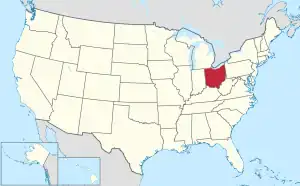 Ohio's location within the U.S. | |
| Coordinates: 41°34′N 84°35′W | |
| Country | |
| State | |
| Founded | February 2, 1824 |
| Named for | David Williams |
| Seat | Bryan |
| Largest city | Bryan |
| Area | |
| • Total | 423 sq mi (1,100 km2) |
| • Land | 421 sq mi (1,090 km2) |
| • Water | 2.1 sq mi (5 km2) 0.5% |
| Population (2020) | |
| • Total | 37,102 |
| • Density | 88/sq mi (34/km2) |
| Time zone | UTC−5 (Eastern) |
| • Summer (DST) | UTC−4 (EDT) |
| Congressional district | 9th |
| Website | www |
Geography
According to the U.S. Census Bureau, the county has a total area of 423 square miles (1,100 km2), of which 421 square miles (1,090 km2) is land and 2.1 square miles (5.4 km2) (0.5%) is water.[5]
Adjacent counties
- Hillsdale County, Michigan (north)
- Fulton County (east)
- Henry County (southeast)
- Defiance County (south)
- DeKalb County, Indiana (southwest)
- Steuben County, Indiana (northwest)
Demographics
| Census | Pop. | Note | %± |
|---|---|---|---|
| 1830 | 387 | — | |
| 1840 | 4,465 | 1,053.7% | |
| 1850 | 8,018 | 79.6% | |
| 1860 | 16,633 | 107.4% | |
| 1870 | 20,991 | 26.2% | |
| 1880 | 23,821 | 13.5% | |
| 1890 | 24,897 | 4.5% | |
| 1900 | 24,953 | 0.2% | |
| 1910 | 25,198 | 1.0% | |
| 1920 | 24,627 | −2.3% | |
| 1930 | 24,316 | −1.3% | |
| 1940 | 25,510 | 4.9% | |
| 1950 | 26,202 | 2.7% | |
| 1960 | 29,968 | 14.4% | |
| 1970 | 33,669 | 12.3% | |
| 1980 | 36,369 | 8.0% | |
| 1990 | 36,956 | 1.6% | |
| 2000 | 39,188 | 6.0% | |
| 2010 | 37,642 | −3.9% | |
| 2020 | 37,102 | −1.4% | |
| U.S. Decennial Census[6] 1790-1960[7] 1900-1990[8] 1990-2000[9] 2020 [1] | |||
2000 census
As of the census[10] of 2000, there were 39,188 people, 15,105 households, and 10,664 families living in the county. The population density was 93 people per square mile (36 people/km2). There were 16,140 housing units at an average density of 38 units per square mile (15/km2). The racial makeup of the county was 96.51% White, 0.72% Black or African American, 0.23% Native American, 0.52% Asian, 0.01% Pacific Islander, 1.19% from other races, and 0.83% from two or more races. 2.68% of the population were Hispanic or Latino of any race. 43.6% were of German, 17.7% American, 8.1% English and 5.8% Irish ancestry according to Census 2000.
There were 15,105 households, out of which 33.30% had children under the age of 18 living with them, 57.50% were married couples living together, 9.00% had a female householder with no husband present, and 29.40% were non-families. 24.90% of all households were made up of individuals, and 10.50% had someone living alone who was 65 years of age or older. The average household size was 2.52 and the average family size was 3.00.
In the county, the population was spread out, with 26.20% under the age of 18, 8.30% from 18 to 24, 28.70% from 25 to 44, 22.90% from 45 to 64, and 13.90% who were 65 years of age or older. The median age was 37 years. For every 100 females there were 98.70 males. For every 100 females age 18 and over, there were 96.40 males.
The median income for a household in the county was $40,735, and the median income for a family was $47,398. Males had a median income of $33,476 versus $22,136 for females. The per capita income for the county was $18,441. About 3.90% of families and 6.00% of the population were below the poverty line, including 6.20% of those under age 18 and 6.90% of those age 65 or over.
2010 census
As of the 2010 United States Census, there were 37,642 people, 15,075 households, and 10,260 families living in the county.[11] The population density was 89.4 inhabitants per square mile (34.5 inhabitants/km2). There were 16,668 housing units at an average density of 39.6 units per square mile (15.3 units/km2).[12] The racial makeup of the county was 95.9% white, 1.0% black or African American, 0.6% Asian, 0.2% American Indian, 1.1% from other races, and 1.2% from two or more races. Those of Hispanic or Latino origin made up 3.7% of the population.[11] In terms of ancestry, 46.1% were German, 12.0% were Irish, 10.7% were English, and 7.8% were American.[13]
Of the 15,075 households, 31.0% had children under the age of 18 living with them, 53.0% were married couples living together, 9.9% had a female householder with no husband present, 31.9% were non-families, and 27.0% of all households were made up of individuals. The average household size was 2.43 and the average family size was 2.93. The median age was 40.7 years.[11]
The median income for a household in the county was $44,538 and the median income for a family was $52,975. Males had a median income of $40,658 versus $29,064 for females. The per capita income for the county was $21,381. About 9.1% of families and 11.8% of the population were below the poverty line, including 17.6% of those under age 18 and 8.6% of those age 65 or over.[14]
Politics
Williams County is a Republican stronghold county in presidential elections. The last Democrat to win the county was Lyndon B. Johnson in 1964.
| Year | Republican | Democratic | Third party | |||
|---|---|---|---|---|---|---|
| No. | % | No. | % | No. | % | |
| 2020 | 13,452 | 72.12% | 4,842 | 25.96% | 357 | 1.91% |
| 2016 | 11,939 | 68.98% | 4,358 | 25.18% | 1,011 | 5.84% |
| 2012 | 10,047 | 56.74% | 7,266 | 41.04% | 393 | 2.22% |
| 2008 | 9,879 | 53.70% | 8,174 | 44.43% | 343 | 1.86% |
| 2004 | 12,040 | 64.60% | 6,481 | 34.77% | 118 | 0.63% |
| 2000 | 9,941 | 62.45% | 5,454 | 34.26% | 524 | 3.29% |
| 1996 | 7,747 | 49.67% | 5,524 | 35.41% | 2,327 | 14.92% |
| 1992 | 7,614 | 43.60% | 4,862 | 27.84% | 4,988 | 28.56% |
| 1988 | 10,782 | 69.18% | 4,666 | 29.94% | 137 | 0.88% |
| 1984 | 10,804 | 74.11% | 3,624 | 24.86% | 150 | 1.03% |
| 1980 | 9,146 | 64.31% | 4,015 | 28.23% | 1,060 | 7.45% |
| 1976 | 7,596 | 59.52% | 4,920 | 38.55% | 246 | 1.93% |
| 1972 | 9,083 | 66.76% | 4,278 | 31.44% | 244 | 1.79% |
| 1968 | 8,059 | 59.76% | 4,456 | 33.04% | 970 | 7.19% |
| 1964 | 5,653 | 42.83% | 7,547 | 57.17% | 0 | 0.00% |
| 1960 | 10,319 | 71.84% | 4,044 | 28.16% | 0 | 0.00% |
| 1956 | 9,784 | 75.21% | 3,225 | 24.79% | 0 | 0.00% |
| 1952 | 9,888 | 74.65% | 3,358 | 25.35% | 0 | 0.00% |
| 1948 | 6,784 | 64.79% | 3,662 | 34.98% | 24 | 0.23% |
| 1944 | 8,738 | 71.89% | 3,417 | 28.11% | 0 | 0.00% |
| 1940 | 9,463 | 69.95% | 4,065 | 30.05% | 0 | 0.00% |
| 1936 | 7,050 | 53.00% | 5,628 | 42.31% | 624 | 4.69% |
| 1932 | 5,459 | 43.34% | 6,860 | 54.46% | 278 | 2.21% |
| 1928 | 8,138 | 71.81% | 3,136 | 27.67% | 58 | 0.51% |
| 1924 | 5,802 | 56.41% | 2,795 | 27.18% | 1,688 | 16.41% |
| 1920 | 7,000 | 61.75% | 4,183 | 36.90% | 153 | 1.35% |
| 1916 | 3,132 | 45.57% | 3,552 | 51.68% | 189 | 2.75% |
| 1912 | 1,145 | 17.85% | 2,875 | 44.81% | 2,396 | 37.34% |
| 1908 | 3,625 | 50.84% | 3,329 | 46.69% | 176 | 2.47% |
| 1904 | 3,827 | 57.91% | 2,565 | 38.82% | 216 | 3.27% |
| 1900 | 3,416 | 51.70% | 3,049 | 46.15% | 142 | 2.15% |
| 1896 | 3,191 | 47.16% | 3,530 | 52.17% | 45 | 0.67% |
| 1892 | 2,745 | 46.76% | 2,583 | 44.00% | 542 | 9.23% |
| 1888 | 3,071 | 48.99% | 2,977 | 47.50% | 220 | 3.51% |
| 1884 | 2,907 | 48.62% | 2,897 | 48.45% | 175 | 2.93% |
| 1880 | 2,881 | 50.92% | 2,596 | 45.88% | 181 | 3.20% |
| 1876 | 2,701 | 51.26% | 2,546 | 48.32% | 22 | 0.42% |
| 1872 | 2,213 | 59.84% | 1,419 | 38.37% | 66 | 1.78% |
| 1868 | 2,280 | 55.69% | 1,814 | 44.31% | 0 | 0.00% |
| 1864 | 2,154 | 60.27% | 1,420 | 39.73% | 0 | 0.00% |
| 1860 | 1,713 | 56.52% | 1,180 | 38.93% | 138 | 4.55% |
| 1856 | 1,327 | 55.34% | 1,022 | 42.62% | 49 | 2.04% |
Government
Williams County has three county commissioners who oversee the various county departments. Current commissioners are: Brian Davis, Lewis Hilkert, and Terry Rummel.[16]
Communities
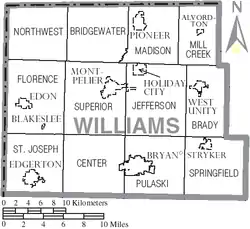
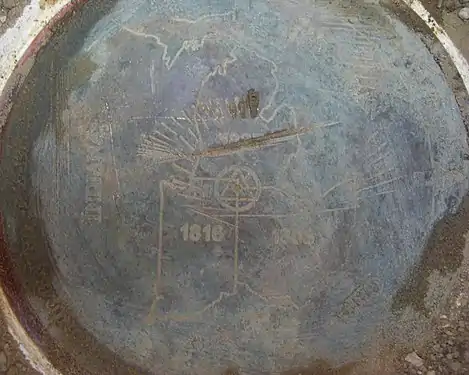
City
- Bryan (county seat)
Townships
Census-designated places
Unincorporated communities
References
- 2020 census
- "Find a County". National Association of Counties. Archived from the original on May 31, 2011. Retrieved June 7, 2011.
- "Ohio: Individual County Chronologies". Ohio Atlas of Historical County Boundaries. The Newberry Library. 2007. Archived from the original on April 6, 2016. Retrieved February 14, 2015.
- "Williams County data". Ohio State University Extension Data Center. Retrieved April 28, 2007.
- "2010 Census Gazetteer Files". United States Census Bureau. August 22, 2012. Archived from the original on May 4, 2014. Retrieved February 11, 2015.
- "U.S. Decennial Census". United States Census Bureau. Retrieved February 11, 2015.
- "Historical Census Browser". University of Virginia Library. Retrieved February 11, 2015.
- Forstall, Richard L., ed. (March 27, 1995). "Population of Counties by Decennial Census: 1900 to 1990". United States Census Bureau. Retrieved February 11, 2015.
- "Census 2000 PHC-T-4. Ranking Tables for Counties: 1990 and 2000" (PDF). United States Census Bureau. April 2, 2001. Archived (PDF) from the original on March 27, 2010. Retrieved February 11, 2015.
- "U.S. Census website". United States Census Bureau. Retrieved January 31, 2008.
- "DP-1 Profile of General Population and Housing Characteristics: 2010 Demographic Profile Data". United States Census Bureau. Archived from the original on February 13, 2020. Retrieved December 27, 2015.
- "Population, Housing Units, Area, and Density: 2010 - County". United States Census Bureau. Archived from the original on February 13, 2020. Retrieved December 27, 2015.
- "DP02 SELECTED SOCIAL CHARACTERISTICS IN THE UNITED STATES – 2006-2010 American Community Survey 5-Year Estimates". United States Census Bureau. Archived from the original on February 13, 2020. Retrieved December 27, 2015.
- "DP03 SELECTED ECONOMIC CHARACTERISTICS – 2006-2010 American Community Survey 5-Year Estimates". United States Census Bureau. Archived from the original on February 13, 2020. Retrieved December 27, 2015.
- Leip, David. "Dave Leip's Atlas of U.S. Presidential Elections". uselectionatlas.org. Retrieved April 8, 2018.
- "Williams County Commissioners". Williams County Ohio Homepage. Archived from the original on July 16, 2012. Retrieved October 11, 2012.
External links
- Williams County Government's website
- https://www.facebook.com/groups/TheWilliamsCountyOhioVirtualMuseum/ The Williams County, Ohio Virtual Museum on Facebook